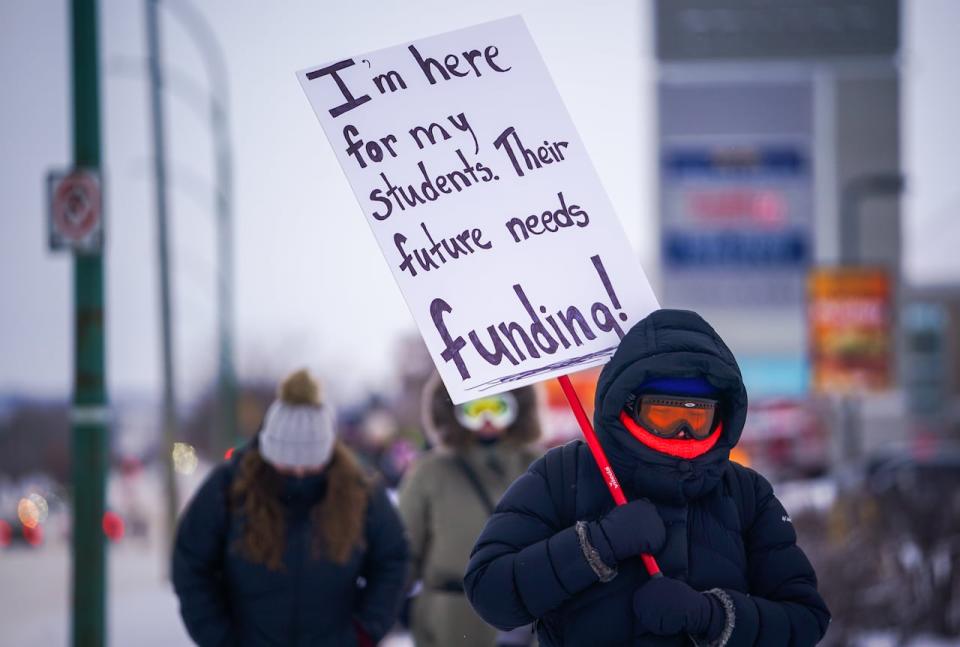Proposed deal for Sask. teachers includes classroom complexity task force: internal document

The executive of the Saskatchewan Teachers' Federation (STF) is endorsing a proposed contract agreement that will be offered to teachers at the end of the month.
The proposal includes some new measures to address classroom complexity that were absent from the previous proposed agreement that was resoundingly rejected by teachers earlier this month.
According to an internal document sent to teachers and obtained by CBC News, the new proposed collective bargaining agreement includes promises of a task force on classroom complexity.
The document says that a ministerial task force on classroom complexity, to be co-chaired by the STF, the Ministry of Education and Saskatchewan School Board Association (SSBA), will seek to identify the situation in schools and offer solutions to it. It says the task force will include teachers, students and parents.
"The goal of it is to ensure that real, lived experiences and individuals who are directly connected to classrooms have their voices amplified and have the opportunity to share those experiences directly to the minister," federation president Samantha Becotte said in an interview.
She says the agreement would include $18 million in new funding each year to target classroom complexity for the length of the agreement, on top of the multi-year funding agreement previously signed between the SSBA and the provincial government, which sets aside $316.1 million per fiscal year from 2024 to 2028.
There is no mention of class size, which has been a central issue in the contract dispute, in the internal document provided to teachers.

A demonstrator in Saskatoon walks the line during a province-wide, one-day strike organized by the members of Saskatchewan Teachers’ Federation in January. Teachers will vote on a new proposed agreement at the end of May. (Heywood Yu/The Canadian Press)
Becotte says she envisions class size as part of class complexity, but there is nothing concrete about size in the proposed agreement.
"Classroom complexity isn't going to be solved within one collective agreement or one budgeting cycle," she said.
The proposed agreement covers a three-year term from Sept. 1, 2023 to Aug. 31, 2026.
According to a news release from the STF, teacher salaries would increase three per cent in the first two years of the agreement and two per cent in the final year at a cost of about $91.5 million.
The document highlights a "one per cent [of the base salary costs] market adjustment that will be equally distributed across all [teacher] increment grids and calculated after the three per cent raise, retroactive to September 1, 2023. This is in addition to the salary increase of eight per cent over the three years of the agreement."
Becotte would not elaborate on how that one per cent affects the salary increase, but said other compensation has been negotiated on top of the eight per cent increase.
Teachers will vote on the proposal on May 29 and 30. The results are expected to be announced on May 30.
Premier Scott Moe would not speculate on the result of the ratification vote, but said the government feels the proposed agreement is "a fair deal and a good deal for parents, for students and for educators across the province."
He said the proposal provides wage certainty for educators. He added that the government is committed to investing in classroom complexity and said the government needs to be a part of that conversation.
'Substantial gains'
In its document, the STF said its bargaining committee made "substantial gains" in its five days of formal and informal negotiations with the province's bargaining committee.
A letter of understanding for "violence-free classrooms attached to the agreement includes:
A reporting process for such incidents, something not previously available to teachers.
Data collection on the incidents.
Establishing a policy on it before June 30.
A table discussion is expected to be chaired by Saskatchewan Education Minister Jeremy Cockrill, alongside STF and school board representatives.
In the last agreement, an accountability framework laying out how the multi-year funding agreement between the SSBA and Saskatchewan government could be spent was mentioned in a single sentence. Becotte says it is now part of the new proposed collective agreement.
"This is, in my mind, a positive step forward and a change of course from this government where these are commitments that are being made to start addressing classroom complexity and the challenges that students and teachers face in schools across the province," Becotte said.
"It's not a solution. There's still lots of work that needs to be done."
Regina teacher plans to vote no
Devon Floyd, a Regina teacher, says he will be voting no on the proposed contract.
When he voted in favour of sanctions during the contract dispute, he says, it was with class size and complexity in mind.
However, he says he has broken down the $18 million in new funding each year to target classroom complexity and found it is not enough.
"I don't think that is going to make any difference in the day-to-day issues that the current classroom is facing," Floyd said.
He wants to see class caps, such as those implemented in Nova Scotia, added to the provincial agreement in Saskatchewan.
Floyd says it seems the teachers' union doesn't expect to get a better offer from the government, but he is optimistic given the government moved after the previous contract was rejected by teachers.
"It's unfortunate, but we haven't exhausted all options as far as an indefinite full on withdrawal of labour services in this province," he said.
"I would hate to do that … but I also fundamentally believe that if we don't begin to address classroom complexity in a tangible way in this contract it will only get worse."

